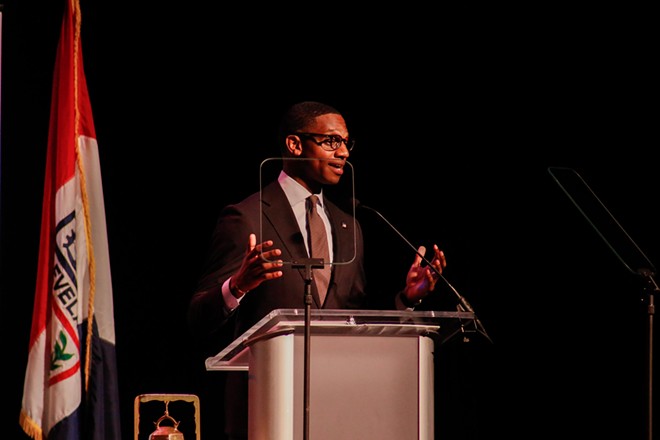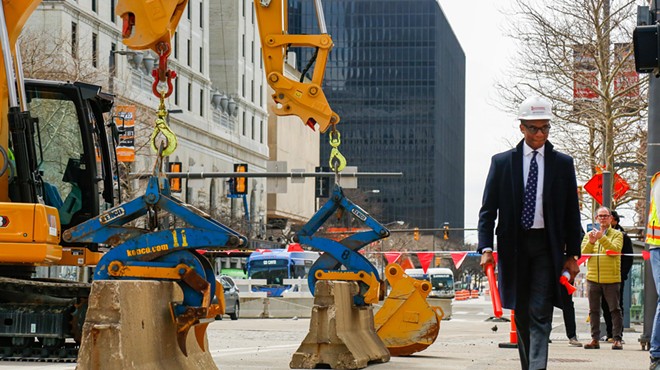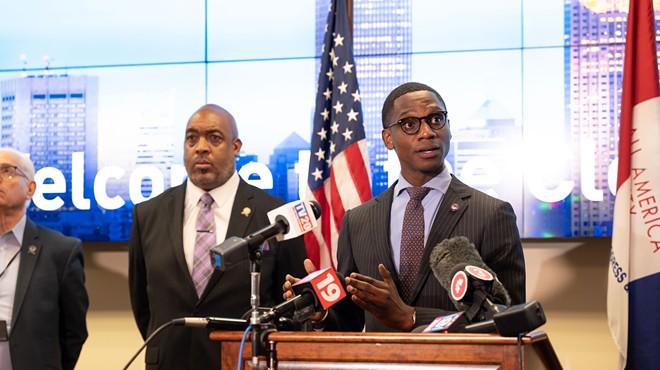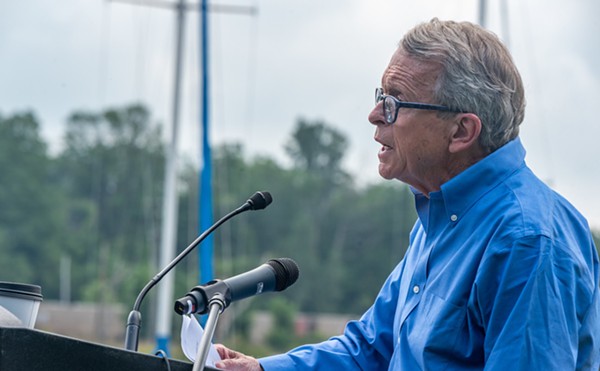"There's a lot that goes into getting hard things done," Bibb told Scene, not shying away from critical backlash: "Being on this side of the table is very different than being on Twitter."
On Thursday, from a podium on stage left of the Mimi Ohio Theater during his State of the City speech, Bibb echoed what may be his greatest personal lesson in the two years since he took office. That bringing Cleveland fully into a 21st century world takes time. And convincing the public of that fact, as brought up several times in his speech, is another job in itself.
As in previous State of the Citys, Bibb toured a long list of past-year accomplishments, and those in the hopper currently, wavering between data points and empathetic anecdotes. He did this seemingly more cognizant of Clevelanders' eagerness to see the change he's been vowing to spark since 2021. (Bibb reminded his audience twice on Thursday that the stage he spoke on was a part of the "largest theater district outside of New York City!")
"To my southeast side family, I see you. City Hall sees you," he said. "And cranes are coming to the southeast side."
The city's Residents First legislative package, which Council approved in February, came off as a battle cry to shady property owners. An angered Bibb seemed eager to lead the charge on the issue of "predatory" owners, those all the way in New York or Belgium, as more of a far-reaching one.
Such negligent owners, he said, lead to a proliferation of vacant or abandoned houses, mostly on Cleveland's east and southwest sides. Empty homes become grounds for illicit activity, homes for squatters. It was, he recalled from a walking tour last year, Clevelanders' top safety concern.
"It was a continued refrain of, 'That house! That house over there!'" Bibb said. He contextualized, eventually using the anecdote of a "Mrs. Richardson" to segue into, once again, his $50 million Site Readiness Fund as a blight vaporizer: "You see, safety and the built environment are intertwined," Bibb added.
He didn't shy away from, as expected, allotting enough of his address to public safety woes. ("Safety always comes first," Bibb said.) After all, last summer's shooting in Downtown's Warehouse District, which injured nine Clevelanders, and the shooting between teenage gangs on Public Square following Winterland were dents in the area's fragile relationship with bad perception.
Bibb had two answers. On one side, a new Crime Gun Intelligence Center, like those in Columbus and Cincinnati, will crack down on illegal firearms. On the other, his RISE Initiative that kicked patrol officer wages up 14 percent has led to, he claimed, a near doubling of police force applications. And in March, the graduation of 52 cadets from the Cleveland Police Academy.
"That's more," Bibb calculated, "than the previous four classes combined."
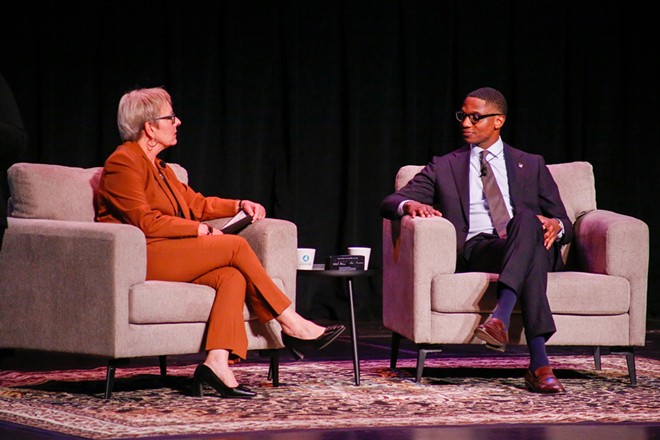
There were few newsworthy moments, but Bibb did address the future of CMSD, hinting that schools will be closed as the district deals with budget deficits in the future. "We can’t continue to operate with an outdated building footprint," he said. "Our schools were built in an era when Cleveland’s population was triple the size. We are overdue to adjust for the here and now."
Although Bibb nodded to the recent Shore-to-Core TIF district's chance to help fund, and actually construct, the waterfront plans, he left out any comment on the Haslams or Cleveland Browns Stadium entirely. If the Browns are to play in a domed Brook Park stadium in 2029, then it's likely that their owners will have to make such a decision to move them soon.
"It's a sensitive topic right now," Ward 3 Councilman Kerry McCormack told Scene afterwards. "A general comment? Yeah, I guess. But, I mean, I've gotten a hundred media requests about [the stadium] already."
McCormack, who smiles at promise at the Bibb administration's lakefront plans, said he related to Bibb's patience reassurance. Especially, he said, after past mayors have, for the most part, tried to make do with a Cleveland status quo.
"It's hard for a lot of regular folks to see what's going on," McCormack said. "Because there was a systems change, right? Housing. Economic development. Lakefront development. Stuff you're not going to feel for a while."
Brenda Bickerstaff, a member of the Community Police Commission, shared a similar sympathy. “You have to understand, the past mayor [Frank Jackson], was here 16 years," she said. "He's picking up where he left off. So he's not going to be able to do everything in two years. So we still got a ways to go.”
Which may be tough news to some residents. Especially seeing the promise on the watefronts. Or seeing countless homes crumbling on neighborhood streets. Or cracked parking lots, empty storefronts, rusted bridges that have sat rusted, to use Bibb's phrasing, over generations.
"That's not an excuse," Bibb said, concluding his speech. "It's a reminder that change doesn't happen overnight. But I'm not going to tell you to be patient. Instead, I ask you to stay engaged, demand better, and be proud of the progress we are making together.”
Subscribe to Cleveland Scene newsletters.
Follow us: Apple News | Google News | NewsBreak | Reddit | Instagram | Facebook | Twitter | Or sign up for our RSS Feed

